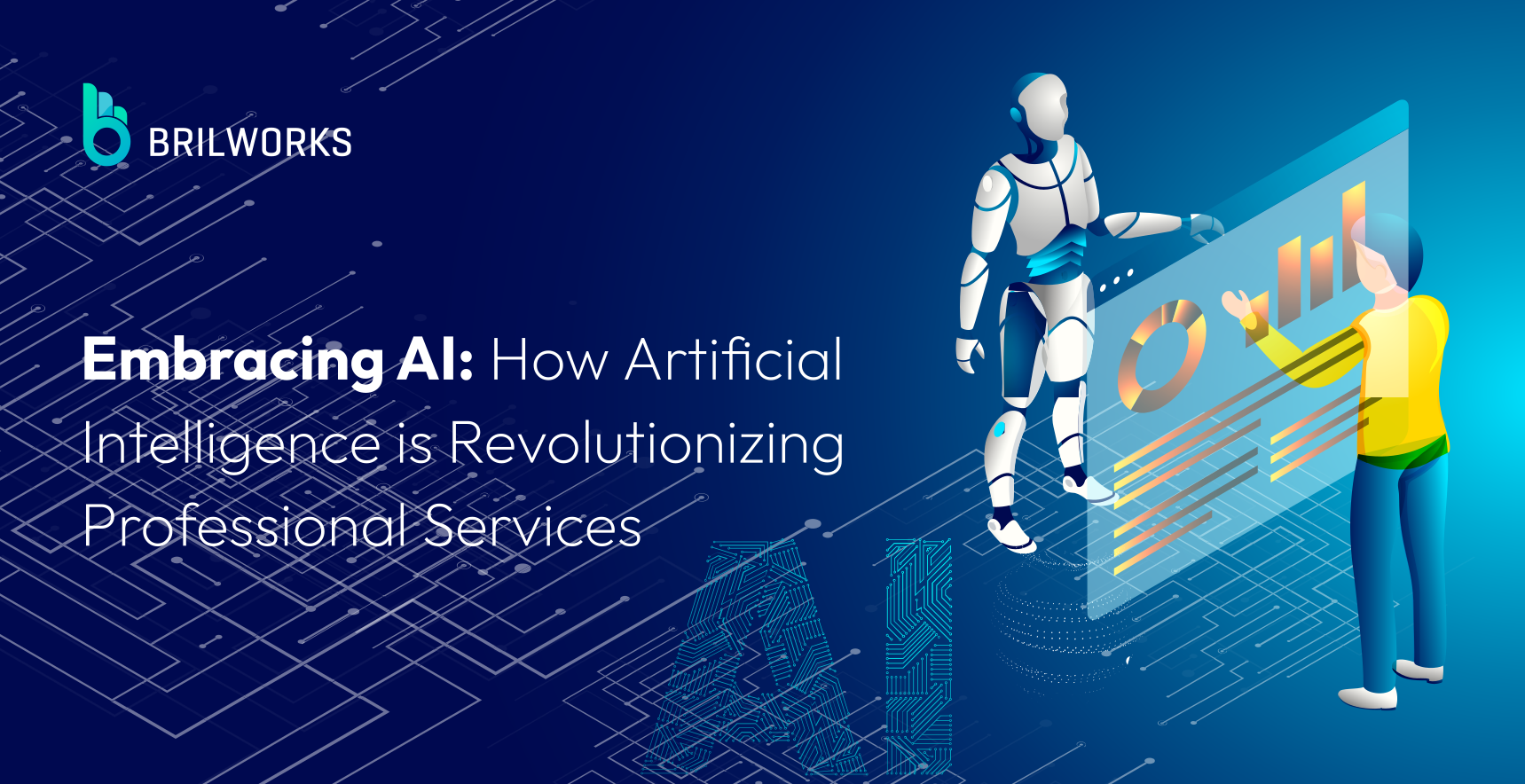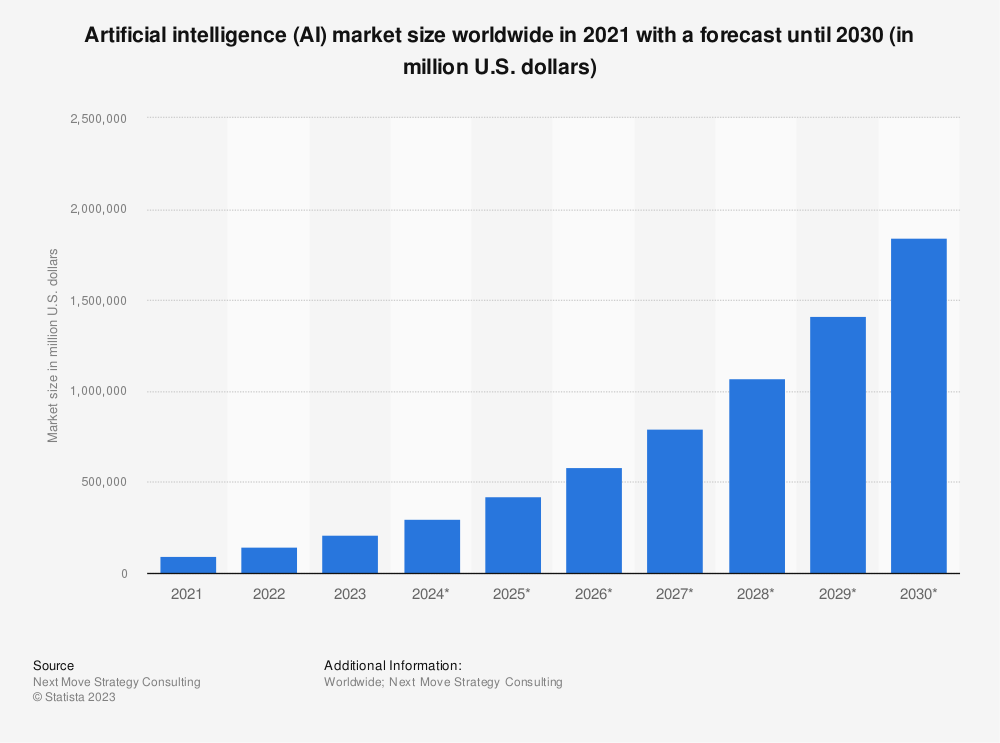COOPERATION MODEL
ARTIFICIAL INTELLIGENCE
PRODUCT ENGINEERING
DevOps & Cloud
LOW-CODE/NO-CODE DEVELOPMENT
INDUSTRY
FRONTEND DEVELOPMENT
CLOUD DEVELOPMENT
MOBILE APP DEVELOPMENT
LOW CODE/ NO CODE DEVELOPMENT
EMERGING TECHNOLOGIES








AI, once a futuristic concept from sci-fi movies, is now weaving itself into our daily lives. From powering self-driving cars and aiding in disease diagnosis to understanding customer behavior in the digital world, Its value, currently nearly 100 billion U.S. dollars, is expected to grow twentyfold by 2030, reaching nearly two trillion U.S. dollars. This demonstrates its tremendous potential that will shape the way we live and work.

AI is on the cusp of emerging as the next major disruptor in the tech world. It's set to reshape the business landscape—boosting productivity, fine-tuning professional services, and enhancing overall service quality. Now is the time for every organization, regardless of size, to ponder joining the AI movement.
This article delves into the transformative power of AI, exploring how it is empowering professional service firms to streamline operations, enhance client experiences, and gain a competitive edge.
Let’s start by defining artificial intelligence.
Artificial Intelligence (AI), as its name suggests, is a technology aimed at training machines to mimic human intelligence or developing machines capable of performing tasks that typically require human intelligence.
It involves the use of algorithms, machine learning, and advanced analytics to enhance decision-making, automate routine tasks, and derive insights from vast datasets. In professional services, AI is revolutionizing processes such as data analysis, customer service, and strategic planning. By embracing AI, professionals can harness its capabilities to streamline operations, improve efficiency, and deliver more tailored and innovative services, marking a paradigm shift in how industries approach and deliver their expertise.
Unleash the potential of AI to drive efficiency, productivity, and innovation. Connect with us.
Artificial Intelligence has been part of our technological landscape for a while now, but what's truly changing the game is the emergence of generative AI. This development is creating a buzz in the tech industry and causing quite a stir on the internet. Importantly, it's exerting a transformative influence across various sectors, with a notable impact on the healthcare industry.
Predictive analysis in healthcare involves a nuanced interplay between human expertise and machine capabilities. While machines excel at processing vast amounts of data swiftly and identifying patterns, human professionals bring a depth of understanding, empathy, and contextual knowledge that machines lack.
The synergy between human insight and machine-driven analytics in healthcare allows for a comprehensive approach. Clinicians can interpret predictive results, consider individual patient nuances, and make informed decisions, ensuring a personalized and compassionate touch to patient care.
In a Radiology journal publication from 2020, an artificial intelligence algorithm demonstrated a 92.5% accuracy in detecting liver metastasis on computed tomography (CT) scans, surpassing the 89.5% accuracy achieved by radiologists.
AI-powered tools are revolutionizing healthcare by enhancing diagnostic accuracy through advanced technologies like image recognition, pattern analysis, and predictive analytics. These tools excel at interpreting medical images, detecting subtle patterns indicative of various diseases, and predicting disease risks based on patient data.
By integrating with electronic health records, providing decision support to clinicians, streamlining workflow, and enabling remote monitoring, AI contributes to more informed and timely diagnoses. With continuous learning algorithms, these tools continuously evolve, staying abreast of medical knowledge and improving diagnostic capabilities.
In legal research and analysis, AI can be a game-changer by automating tasks. It swiftly sifts through heaps of legal data, from case law to statutes, extracting crucial information. AI also dives into legal documents, picking out key terms and spotting potential issues. This helps lawyers up their game in making smart decisions on strategy and negotiations.
AI-powered document review is a transformative technology that is rapidly changing the legal industry and is used to automate many of the tedious and time-consuming tasks involved in document review, such as identifying relevant documents, extracting key information, and summarizing findings. This can free up lawyers to focus on more strategic work, such as developing legal arguments and negotiating settlements.
There are a number of different AI-powered document review tools available on the market, each with its own strengths and weaknesses. The best tool for a particular case will depend on the specific needs of the case and the law firm.
The field of law is undergoing a significant transformation due to the integration of artificial intelligence (AI) into various aspects of legal practice, including research.
One of the primary applications of AI in legal research is in the automation of tasks such as document review and identification of relevant case law. AI-powered tools can scan vast amounts of legal data, including statutes, regulations, and case precedents, to identify documents and case law relevant to a specific legal issue. This automation frees up lawyers from time-consuming manual tasks, allowing them to focus on more strategic aspects of legal research.
With the advent of generative AI tools, AI seems to be stepping into the shoes of human representatives, boasting superior capabilities in resolving customer problems 24/7. In addition, they can function as screening tools to handle basic customer queries, lightening the workload for companies. This not only provides them with more time but also allows the allocation of human resources to enhance the company's infrastructure and focus on delivering personalized customer service. Here are ways to utilize AI to improve customer service.
AI-powered chatbots are revolutionizing customer engagement for businesses. They simulate human conversation, offering 24/7 customer support, addressing frequently asked questions, and making product recommendations. These chatbots enhance customer experiences by analyzing data and delivering personalized recommendations.
By leveraging AI's capabilities in data analysis, machine learning, and natural language processing, organizations can deliver personalized customer experiences that are tailored to individual needs and preferences.
This technology uses a variety of data sources to personalize customer service, including:
This data is then used to create customer profiles that can be used to:
The financial world is no stranger to the transformative power of technology. While it has long empowered major financial institutions, this influence is now expanding to small businesses as well. With the rise of new AI tools, automation of tasks, improved risk assessment, personalized customer experiences, and the creation of intelligent financial products and services are becoming increasingly accessible.
Primarily, AI streamlines manual processes, freeing up human expertise to focus on upgrading existing AI programs or engaging in more critical tasks. AI, in turn, continuously analyzes vast datasets, facilitating well-informed lending, investing, and insurance decisions. Effortlessly running personalized campaigns by analyzing customer behavior, AI accomplishes in moments what might require considerable time and effort for a human.
Moreover, these programs play a crucial role in safeguarding data. Although AI's disruptive influence on finance is in its early stages, its impact is undeniable. Through driving innovation, improving efficiency, and uncovering new opportunities, AI is shaping the future of finance.
Financial institutions deal with colossal amounts of data, including billions of transaction records and customer information. Managing this extensive data, which encompasses payment-related details, is a monumental task that surpasses human surveillance capabilities, even with a large workforce. Despite employing thousands of employees, handling such vast data necessitates a dedicated team.
Risk management revolves around evaluating data, and while it may lack human intellect, AI significantly outperforms human capabilities when it comes to working with extensive datasets. AI is reshaping risk management in finance by streamlining data analysis, ensuring precise credit scoring, and enhancing fraud detection. It excels in conducting compliance checks, effortlessly navigating market scenarios, and seamlessly optimizing portfolios. Paired with insights into customer behavior and robust cybersecurity measures, AI provides a practical advantage in risk management, elevating processes to be smarter and more effective in the financial landscape.
AI is transforming personal finance in several impactful ways. Through personalized financial insights, AI analyzes extensive financial data to help individuals make informed decisions, track spending habits, create personalized budgets, and forecast future financial needs like retirement savings.
Furthermore, AI automates time-consuming financial tasks, such as categorizing transactions, reconciling bank accounts, and managing investments.
In addition, AI enhances accessibility to financial advice through chatbots and robo-advisors, providing personalized guidance at a lower cost.
This report highlights the potential of AI in addressing the most significant challenges facing the education sector, revolutionizing teaching and learning practices, and expediting progress.
AI-driven solutions are already causing disruption in traditional educational apps, thanks to their capabilities. Consider any popular app on your smartphone, and upon closer inspection, you'll likely find that AI is already integrated into its core functionality. This integration is no longer a mere enhancement; it has become a necessity. The following points outline how AI has the potential to revolutionize this industry.
Customized learning aims to tailor teaching methods to individual students based on their unique learning skills. AI-powered adaptive learning platforms analyze student data, considering factors like performance, strengths, weaknesses, and learning pace. Using this information, the system crafts personalized learning pathways.
1. AI-Driven Tutoring: AI tutoring systems provide personalized guidance by assessing student understanding, identifying areas of difficulty, and offering targeted explanations and practice exercises.
2. Data-Driven Recommendations: AI algorithms analyze student data, including past performance, interests, and goals, to generate personalized recommendations for educational resources.
3. Conversational Learning Assistants: AI-powered NLP creates intelligent chatbots and virtual assistants that engage with students conversationally, answer questions, provide explanations, and enhance the interactive learning experience.
AI programs can perform tasks like enrollment and scheduling, empowering institutions with data-driven insights and aiding in trend identification, student assessment, and strategic decision-making for resource allocation.
This Automation extends to assessment, providing instant feedback, while adaptive learning ensures students receive appropriately challenging material. Early intervention tools detect struggling students for timely support, and learning analytics offer valuable insights for educators to enhance their teaching methods.
Furthermore, AI optimizes resource allocation by predicting enrollment, staffing needs, and budget requirements.
Addressing the ethical implications of AI in the professional sphere is crucial for businesses as it directly impacts fairness, transparency, and accountability in decision-making processes.
AI systems often process sensitive personal data, making data privacy and security paramount concerns. Businesses must implement robust safeguards to protect this data and comply with applicable regulations.
Data privacy is a critical concern in the age of artificial intelligence (AI). As AI applications thrive on vast datasets, safeguarding sensitive information has become imperative. The inherent risk of privacy breaches raises questions about how personal data is collected, stored, and utilized.
Striking a balance between the benefits of AI-driven insights and protecting individual privacy requires robust regulations and ethical practices. Implementing measures such as anonymization, encryption, and transparent data policies is crucial. As AI continues to evolve, it is essential to prioritize data privacy to build trust and ensure that the transformative power of AI is harnessed responsibly and ethically.
Balancing artificial intelligence (AI) with professional integrity is a delicate task. While AI enhances efficiency and decision-making, ethical considerations must guide its implementation.
Professionals must ensure that AI algorithms are transparent, fair, and devoid of biases. Striking a harmonious blend between the capabilities of AI and the ethical principles of a profession is essential to maintaining trust and accountability.
Continuous oversight, adherence to ethical guidelines, and an awareness of potential pitfalls are crucial elements in navigating this balance. Ultimately, aligning AI applications with the core values of professional integrity ensures that technological advancements contribute positively to various fields without compromising ethical standards.
Preparing for the future involves integrating artificial intelligence (AI) into strategic industry planning. AI's predictive analytics and data-processing capabilities offer invaluable insights, enabling businesses to anticipate trends, optimize resource allocation, and make informed decisions.
From forecasting market shifts to identifying potential risks and opportunities, AI transforms strategic planning into a dynamic and forward-looking process. Integrating AI technologies into industry foresight not only enhances efficiency but also positions businesses to adapt and thrive in an ever-evolving landscape.
Building AI fluency in the workforce is imperative as artificial intelligence (AI) continues to shape the professional landscape. Organizations must invest in training programs and initiatives that empower employees to understand, embrace, and leverage AI technologies effectively.
This fluency goes beyond technical proficiency, encompassing a comprehensive understanding of AI's potential applications, ethical considerations, and its impact on various industries. Cultivating AI fluency ensures that the workforce can collaborate seamlessly with AI systems, driving innovation, improving efficiency, and staying competitive in a rapidly evolving business environment.
AI has emerged as a foundational pillar of industry strategy, reshaping how businesses operate and compete. Its transformative capabilities, ranging from predictive analytics to process automation, have positioned AI as a key driver of innovation and efficiency.
Companies are increasingly integrating AI into their strategic frameworks to gain a competitive edge, optimize operations, and uncover valuable insights from vast datasets. As AI technology advances, its role as a central element in industry strategy is expected to grow, influencing decision-making, customer experiences, and overall business resilience.
Embracing AI as a strategic pillar not only allows organizations to adapt to the demands of the digital age but also opens new avenues for growth and sustainable success in an increasingly AI-driven landscape.
In summary, we've explored the potential benefits of integrating AI into business operations. If you're considering leveraging AI to enhance efficiency and innovation in your professional services, hiring an AI developer can be a strategic move.
AI is poised to become the next revolutionary force, significantly transforming industries by replacing traditional methods and assuming professional roles in certain sectors. Moreover, it can adeptly handle data more efficiently than humans as the volume of data surpasses human capacity, and AI-driven programs continue to gain power. Don't hesitate to embrace this change and revolutionize your business operations.
Get In Touch
Contact us for your software development requirements
Get In Touch
Contact us for your software development requirements